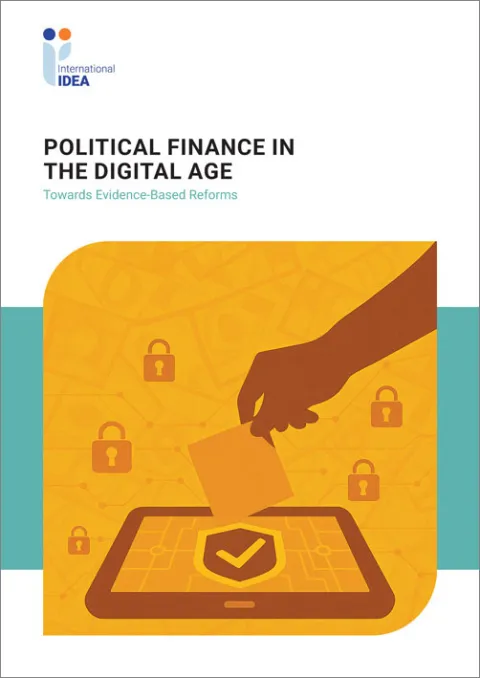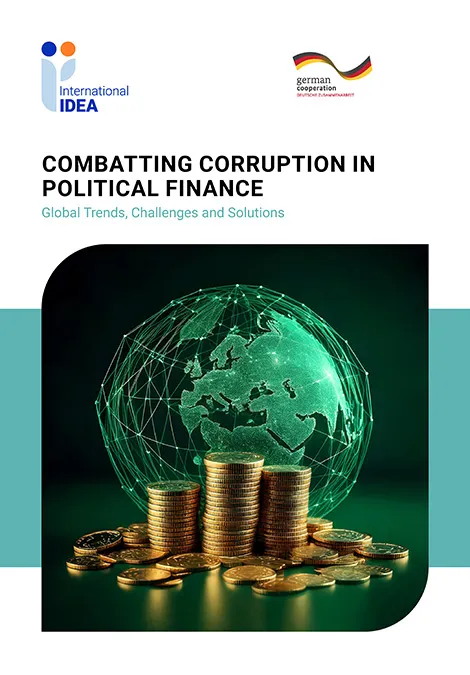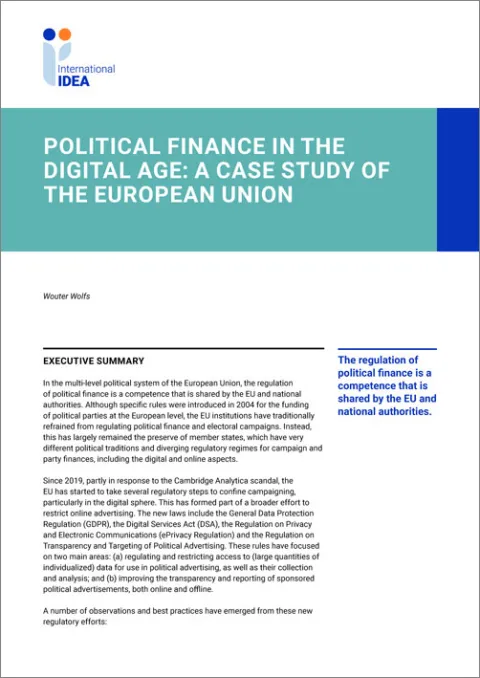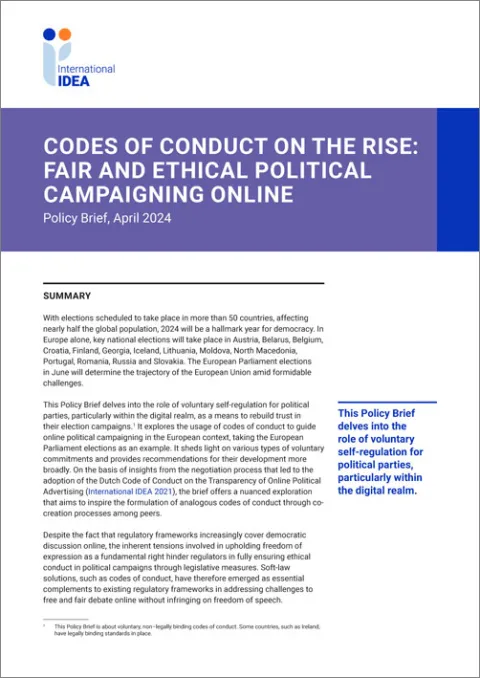| Abuse of state resources | The use of state and public sector powers and resources by incumbent politicians or political parties to further their own prospects of election, in violation of legal and/or other norms and responsibilities governing the exercise of public office. |
|---|
| Allocation calculation | Deals on how public funding is distributed between those that have a right to receive it. Ways of calculating how public funding should be provided could be: either equally to all eligible political parties, or in proportion to, for example, seats or votes won. Most common is a combination of the two. |
|---|
| Anonymous donations | Support, contributions or donations to political parties and/or candidates where the identity of the donor or contributor is not disclosed. |
|---|
| Auditing agency | The body responsible for reviewing the political parties and/or candidates' financial statements declaring their income, expenditure and assets and to monitor their accounts. Such financial reports are often submitted to the auditing agency on an annual basis or specifically in relation to the electoral campaign. |
|---|
| Ban on contributions | A prohibition to limit the influx of money or other types of support given a candidate's campaign or political party by an individual or an organization. |
|---|
| Campaign finance | Financial transactions, to political parties or candidates, related to an electoral campaign which could include formal, financial, or in-kind donations or expenditures. |
|---|
| Contribution limit | A maximum amount of money that an individual, organization or political party may contribute to a candidate's campaign or to a political party annually or per election period. |
|---|
| Corporate donations | Support, contributions or donations to political parties and/or candidates from entities such as corporations, companies and/or business enterprises. |
|---|
| Direct Public Funding | Government provision of money or subsidies to political parties or candidates during election campaigns or for regular party financing. |
|---|
| Disclosure | The obligation that political parties and candidates must provide certain financial information, submit reports or make financial statements regularly (often annually) or in relation to an election campaign. Reports should be submitted to the relevant body which often is the electoral management body, government auditing agency or electoral enforcement agency. The disclosure sometimes includes the requirement of revealing the identity of the donors. |
|---|
| Donations/contributions | A gift taking various forms such as cash, services or anything else of value given from an individual or an organization with the purpose of supporting a certain political party or candidate. |
|---|
| Earmarking | A provision that direct public funding provided to political parties must only be used for certain purposes such as for election campaign purposes; ongoing party activities (administration, public awareness campaigns, policy platform development, voter interaction or membership drives) or for the use of particular institutions within political parties, such as youth or women's wings or research/policy institutions within parties. |
|---|
| Electoral campaign period | A specified period of time during which official campaigning is regulated. |
|---|
| Eligibility | The right of political parties (and in some cases candidates) to the provision of direct public funding based on criteria such as having representation in an elected body; winning a certain share of votes in the previous or in the next election; holding a certain share of seats in parliament won either in the previous or in the next election; based on the number of candidates presented by the party (in the preceding or forthcoming election). The criteria often include a certain percentage that must be fulfilled. |
|---|
| Enforcement agency | The controlling body in charge of monitoring that political parties and candidates act in compliance with the financial legislation in place. The responsible agency could be the national Electoral Management Body, a specially created body or a government department. |
|---|
| Enhanced due diligence | Enhanced due diligence are requirements for banks and financial institutions to use “policies, procedures, and processes for obtaining customer information and assess the value of this information in detecting, monitoring, and reporting suspicious activity”, going beyond regular provisions for due diligence. These are applied towards political actors to mitigate the risk of corrupt practices and money laundering. |
|---|
| Equitable playing field | Candidates competing for election have different abilities to fundraise and receive campaign contributions with which they will run their campaigns. In order to level the playing field, the State can provide public funding and, furthermore, make it conditional. |
|---|
| Foreign interests | In order to limit influence over national politics to forces within the country, it is quite common to ban foreign interests from making donations to political parties. Among the entities prohibited to contribute directly or indirectly are governments, corporations, organizations or individuals who are not citizens; that do not reside in the country or have a large share of foreign ownership. |
|---|
| Gender equality among candidates | Some countries use financial measures in order to encourage and increase gender equality among candidates and within political parties in general. This can include earmarking public funding to women's wings or for gender-related activities, or to reduce the nomination deposit required of women candidates. |
|---|
| Government contracts | Private companies that are providing goods, works or services to the government are potentially susceptible to corruption, and conflict of interests when donating to political parties. |
|---|
| Indirect Public Funding [including media] | Government provision of resources with a monetary value to political parties or candidates for the election campaign or for regular party financing, such as transport, venues, free or subsidized media access to public or private TV, radio, newspaper or other media. |
|---|
| In-kind contributions | Non-financial donations provided in the form of goods and services, such as use of venues for events free of charge, using vehicles or non-monetary gifts. |
|---|
| Itemized income | Parties are in some countries not only required to disclose their general income as a total amount but also in more detail, listing the amounts received from specific sources allowing more insight into their funding. |
|---|
| Itemized spending | Parties are in some countries not only required to disclose their general spending but also in more detail, listing the amounts spent on specific posts allowing for more insight into their activities. |
|---|
| Loophole | An ambiguity in the legal framework used to avoid or getting around laws and to exploit the system. |
|---|
| Monitoring | The systematic and objective observation and documentation of financial activity, i.e. the supervision of donations to and expenditure of parties, in order to identify irregularities in financial flows. |
|---|
| Partial government ownership | If a business is partially owned by the government, and were to donate to a political party, that would entail a clear conflict of interest and would be a growing ground for potential corruption. |
|---|
| Political finance | The concept encompasses all financial flows to and from political parties and candidates. It includes formal and informal income and expenditure, as well as financial and in-kind contributions. These transactions are not limited to a certain time period. |
|---|
| Political finance oversight | Theprocess of ensuring that political parties and candidates conduct themselves in line with the provisions of the legal framework. This may, for example, include receiving reports and investigating breaches, administering the provision of public funding, applying sanctions or hearing appeals. |
|---|
| Political party expenditures | The overall spending by political parties on political party activities and election campaigns. |
|---|
| Private donations | Financial contributions from individuals funding the activities of the political party, the candidate and the electoral campaign. |
|---|
| Public funding | A system where monetary assistance is provided by the government to qualified political parties or candidates for their campaigns or regular party activities. |
|---|
| Public tender/public procurement | Government procurement of goods, works and services constitute one of the most corruption sensitive areas of government. A large percentage of state funds are put into public procurement and therefore opens up opportunities for personal enrichment and constitute an area wherein business interests may offer bribes to gain advantages over their competitors. |
|---|
| Regular party funding | Non-campaign related finances, including donations and expenditure, of political parties, organizations and associations spent on an annual basis to maintain routine party operations. |
|---|
| Sanctions | Penalties in cases of financial misconduct of a party subject to the regulation. Actions such as irregularities in financial reporting, non-compliance with financial reporting regulation, improper use of public funds may result in either criminal or administrative sanctions including the loss of funds for the party, administrative fines or deregistration. |
|---|
| Spending limits | A maximum amount that a political party or a candidate can spend during the electoral campaign period or during a defined period of time; for example per constituency or per voter. The limit on expenditures sometimes also covers third party expenditures which refer to expenditure incurred on behalf of a political party or candidate by a different entity. |
|---|
| State resources | Resources and powers belonging to the public sector including personnel, financial, material, venues, vehicles, materials and other resources. |
|---|
| Third-party spending | In many elections, not only political parties and candidates spend money trying to get elected - other actors (third parties) may produce and run tv-commercials, put up billboards and in various ways attempt to support a given candidate or political party that aligns with their interests. |
|---|
| Vote buying | A form of political swindling that is intended to increase the number of votes a particular candidate or political party receives in an election by providing money or other benefits to constituents in exchange for their vote. |
|---|





